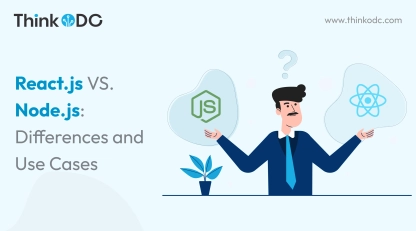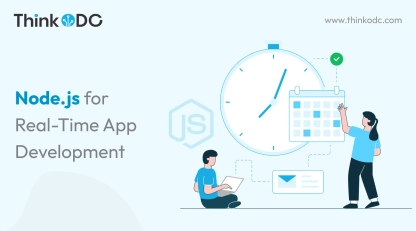If you're starting or growing your business, you might have heard about Node.js.
Node.js is not just a runtime environment; it's a game-changer for startups. With its asynchronous, event-driven architecture, Node.js empowers developers to craft lightning-fast, scalable applications.
So, why do many startups use Node.js? Let's check out some numbers to find out.
- Over 30 million websites use Node.js globally, with 6.3 million just in the US.
- Some monster companies are even built with Node, like Amazon, Netflix, eBay, Reddit, LinkedIn, Tumblr, and PayPal.
- As per Statista, Node.js is one of the top frameworks for web apps among developers now.
Thus, it makes sense to use Node.js if you're considering launching a startup.
But, to build web applications, you'll need to start hiring Node.js developers. Getting backend engineers fluent in Node and JavaScript is key to any startup's success.
However, recruiting and onboarding Node talent comes with unique challenges.
When exactly should you look to hire? Where do you find qualified candidates? What interview tactics will accurately assess abilities?
Not to worry! In this post, we'll explore those questions thoroughly. Let's get started!
When to Hire Node.js Developers
Now that we know why Node is a great choice for startups, let's look at some of the key scenarios where you should consider bringing on dedicated Node.js developers:

When Launching a New Node.js Product or Service
If you're building a new web or mobile app from scratch with Node.js, you'll need a solid development team in place early on. Hiring dedicated developers who can architect and build out the core application infrastructure allows you to bring an innovative product to market faster.
Bringing on engineers with experience launching new Node.js products means you can count on having the technical expertise needed to go from initial concept to working prototype quickly. Their familiarity with Node.js best practices will also ensure your codebase follows scalable patterns from day one.
When Scaling an Existing Node.js Application
Once your Node.js app enters a growth stage, the demands on your engineering team multiply quickly. Bugs that need fixing, new features to build, and optimization work pile up. At a certain point, your current developers just won't have enough bandwidth to tackle it all.
That's when bringing on additional Node.js engineers can really move the needle. More team members mean you can divide up tasks, cover more ground each sprint, and keep pushing new code to production consistently.
And with seasoned Node developers onboard, you can also start to specialize roles like having dedicated front-end, back-end and DevOps engineers.
When Adding New Features or Functionality
Does your product roadmap include building new functionality like implementing a chatbot, adding real-time data syncing, or integrating machine learning? These types of complex feature projects may require Node.js expertise your current team lacks.
Bringing on Node.js developers with proven experience building the specific features you need can significantly speed up development timelines. And they can transfer valuable knowledge to your existing team along the way.
Read More: Find Out the Next Big Thing in Node.js Development
When Improving Performance or Security
As your user base grows, two common needs arise—improving application performance and enhancing security measures. Addressing either requires seasoned Node.js developers to dive into your codebase and apply optimizations.
Performance tuning tasks like implementing caching strategies, code profiling, and updating database queries benefit from engineers well-versed in Node.js performance best practices.
Note: The applications running with Node.js can perform 50% better. After implementing Node.js, Netflix and PayPal both experienced notable improvements and significant results economically and in performance. With Node.js, PayPal observed a 35% reduction in average response time on their page.
Similarly, upgrading security requires Node experience around threats like XSS, proper encryption, and authentication logic.
Dedicated performance or security engineers with proven Node chops can make substantial improvements your team may not have the bandwidth or expertise to tackle alone.
When Maintaining and Supporting an Established Codebase
Once your Node app hits a steady state, a whole new set of engineering needs arises around maintenance, support, and incremental improvements. Your codebase likely now spans many modules and versions. Bugs still creep up. Additions and tweaks are still required.
Expanding your Node.js development team is key to managing an established codebase. More engineers means you can cover everyday bug fixes, minor updates, and scale support load. It also allows your team to specialize based on the modules and features they know really well.
When Migrating Existing Apps to Node.js
If you have an aging application written in another language like PHP or Ruby, re-platforming it to Node.js could deliver performance, scalability, and cost benefits. But re-platforming a large, complex codebase requires Node.js migration experts.
Hiring engineers with experience moving legacy applications to Node.js will make the process far smoother. They will know techniques for gradually porting code, maintaining parallel systems, and minimizing migration risks. Their expertise can turn a painful migration into a strategic win.
You now know when it's the best time to hire a developer for a startup, but how can you find one?
It's time to find out.
Where to Find Node.js Developer Candidates
Once you decide it's time to hire additional Node.js developers, the next step is sourcing a strong pool of candidates to evaluate. Here are some of the top places to look:

Online Job Boards
General job sites like Indeed, Monster, and LinkedIn are a good starting point for finding available Node.js developers looking for work. You can post and promote open positions to surface candidates actively searching for jobs.
The key is crafting a compelling job description highlighting your Node.js needs. Share details on the types of projects and features the engineer would work on. Also, list the required and nice-to-have skills you seek.
While some promising candidates will apply directly, be prepared to sift through many unqualified applicants. Job boards cast a wide net, but are unlikely to deliver your dream candidate on a silver platter.
Freelance Marketplaces
Websites like Upwork, Toptal, and Guru let you connect with skilled freelance professionals specializing in Node.js development. This allows you to potentially fill talent gaps flexibly without making a full-time hire.
Competition is high on freelance platforms, so you’ll need to sell candidates on your compelling project. Create a short screening task to assess their Node.js abilities. And be prepared to act quickly since in-demand freelancers field many offers.
The caliber of talent attracted to freelance work varies widely. But with diligent vetting, you can find capable freelance Node developers to augment your team.
Top Development Companies
If you need to rapidly scale up Node.js talent, hiring an established development firm skilled in Node can deliver results quickly. Companies like this have existing, vetted teams versed in Node they can immediately allocate to your projects.
The benefits are speed and risk reduction, but the Node.js developer cost is higher than individual hires. Still, dev shops can make sense for short-term, temporary projects where you need to spin up or down team sizes rapidly. Be crystal clear on project specifications and timeline expectations.
Offshore Developers
Thanks to remote work, hiring offshore Node.js teams in lower-cost-of-living countries has become more feasible. Top offshore development countries like India, Poland, and Ukraine offer skilled yet affordable engineers.
But beware of very low-bid offshore teams—you often get what you pay for. Do your due diligence validating capabilities and commitment to quality. Also factor in added costs around communication, coordination, and alignment.
Outsourced offshore teams can undoubtedly help you stretch your budget if properly vetted. Expect to put in extra effort to foster alignment and communication across time zones and cultures.

Referrals from Your Network
Direct referrals from your own network should not be overlooked as a hiring channel. Inquire with colleagues, advisors, or investors about any strong Node.js developers looking for their next job.
Because they have been pre-vetted to some extent, referrals tend to produce higher-quality candidates. Because of their personal connection, they may be more eager to join your team.
Just make sure to evaluate referrals objectively on their own merits while still conducting standard interviews. Don't let the referral sway your final hiring decision.
Now that you know where to find the top-notch Node.js developers, How can you actually recruit them?
Let's find out.
How to Hire Node.js Developers
Once you have a solid pool of candidates, it's time to work through screening, interviews, assessments, and offers. Here are some tips for hiring right dedicated developers effectively:

Define Clear Requirements
Before evaluating any candidates, be very clear on the skills and experience you need for the role.
- What specific projects and responsibilities will they own?
- What types of Node.js experience are required to deliver successfully?
- What technical strengths or specialities are most important?
Drill down into must-have qualifications vs. nice-to-have skills. This will focus your search and evaluation process so you find candidates well-aligned to the role.
Write a Compelling Job Description
Your job description is often developers’ first impression of your company and opportunity. An engaging, well-crafted description can attract better candidates.
Be sure to cover:
- Brief overview of your company and mission
- Description of the role and primary responsibilities
- Required qualifications and skills
- Preferred experience and technical strengths
- Details on compensation, benefits, work environment
Paint a picture of both the day-to-day work and the greater purpose and impact they’ll have. Top developers crave meaningful projects that leverage their skills.
Post on Multiple Platforms
Increase your chances of connecting with great candidates by posting to multiple channels:
- Your company careers page and social media
- General and niche job boards
- Relevant online communities and groups
- University job posting sites
Casting a wide net helps position you in front of more of the active and passive job seekers you want to connect with.
Carefully Screen Resumes and Portfolios
Once applications roll in, carefully review each resume and screen for must-have qualifications before progressing them. Look for:
- Solid educational credentials in computer science or engineering
- Depth of professional Node.js experience
- Exposure to relevant frameworks like Express and NestJS
- Types of projects and responsibilities held
- Cultural fit and alignment with your team
Also review code samples and portfolios to assess their development skills firsthand. Identify those that look promising to advance to the interview round.
Conduct Skills-based Interviews
During the interview process, assess both hard technical abilities and soft skills Node.js developers relevant to the role.
Technical interviews should include:
- Node.js knowledge questions
- Assessments of their experience with key tools and frameworks
- Code reviews on previous Node.js projects
- Technical problems for them to discuss and solve
Soft skill discussions should cover:
- How they approach development projects end-to-end
- Collaboration style and teamwork abilities
- Communication skills
- Cultural fit
- Passion for the role and opportunity
Take time to thoroughly evaluate their capabilities from every angle.
Make a Timely Offer
Once you find your ideal candidate, move quickly to make an offer before they accept another role. Be prepared to answer any questions on compensation, benefits, or other job details.
Follow up frequently with them and try to get a signed acceptance ASAP. Don’t lose a great candidate due to slow follow-up.
Conclusion
Finding and hiring talented Node.js developers is crucial for successfully scaling your engineering team. Carefully evaluate when your startup needs additional Node talent. Source promising candidates from a variety of online communities, job sites, and your network. And run a rigorous, skills-based screening process to identify the best-fit developers for your needs.
Investing in growing a strong roster of Node.js talent can significantly accelerate the development of innovative new products and features. With the right team expansion strategies, you can continue leveraging the power of Node to rapidly deliver technology that moves your startup forward.
If you're looking to build out an agile, cost-efficient Node.js team, partner with ThinkODC. With over a decade of expertise building Node apps, ThinkODC provides startups access to top-tier Node.js developers at affordable rates.
Our rigorous recruitment and hands-on mentoring ensure you get a skilled Node.js team up and running quickly. ThinkODC offers the talent and flexibility that growing startups need to scale their backend tech fast.





